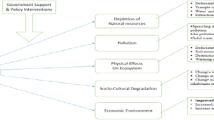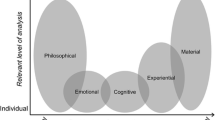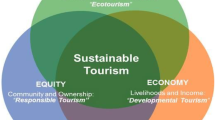Abstract
This study aimed at gaining an understanding of the formation of residents’ Environmental Conservation Behaviour (ECB) to promote sustainable tourism development in Chinese mountain areas. In particular, a theoretical framework was constructed by merging residents’ mountain attachment and their environmental values, and awareness of environmental consequences based on the Cognition Behaviour Theory. This research sampled 642 residents with convenience sampling method in Jiuzhaigou and Mount Qingcheng, and structural equation modelling analysis was conducted to identify the relationships among the above variables. Results verified that mountain attachment affected people’s awareness of environmental consequences, which then affected their ECB. Environmental values and mountain attachment directly and positively influenced ECB. Moreover, awareness of environmental consequences played the most prominent role in predicting ECB among all the predictors in this study. In all, this study derived several significant implications which can not only contribute to environmental management policies in tourism field but also help to improve the levels of the antecedents of residents’ ECB and promote sustainable tourism development in Chinese mountain areas.
Similar content being viewed by others
References
Ajzen I (1991) The theory of planned behavior. Organizational Behavior and Human Decision Processes 50(2): 179–211. https://doi.org/10.1016/0749-5978(91)90020-T
Axelrod LJ, Lehman DR (1993) Responding to environmental concerns: What factors guide individual action? Journal of Environmental Psychology 13(2): 149–159. https://doi.org/10.1016/S0272-4944(05)80147-1
Ballantyne R, Packer J (2011) Using tourism free-choice learning experiences to promote environmentally sustainable behaviour: The role of post-visit. Environ. Environmental Education Research 17(2): 201–215. https://doi.org/10.1080/13504622.2010.530645
Bandura A (1986) Social foundations of thought and action: a social cognitive theory. Prentice-Hall, London, United Kingdom.
Buta N, Holland SM, Kaplanidou K (2014) Local communities and protected areas: The mediating role of place attachment for pro-environmental civic engagement. Journal of Outdoor Recreation & Tourisms (5-6): 1–10. https://doi.org/10.1016/j.jort.2014.01.001
Carrus G, Scopelliti M, Fornara F, et al. (2013) Place attachment, community identification, and pro-environmental engagement. In Lynne M, Patrick DW (esd.), Place Attachment: Advances in Theory, Methods and Applications. Routledge, London and New York. pp 176–192.
Chen B, Nakama Y (2012) Thirty years of forest tourism in China. Journal of Forest Research 18(4): 285–292. https://doi.org/10.1007/s10310-012-0365-y
Chen MF, Tung PJ (2014) Developing an extended theory of planned behavior model to predict consumers’ intention to visit green hotels. International Journal of Hospitality Management 36: 221–230. https://doi.org/10.1016/j.ijhm. 2013.09.006
Chen HS, Phelan KV, Chang HJ (2016) The hunt for online hotel deals: how online travelers’ cognition and affection influence their booking intentions. Journal of Quality Assurance in Hospitality & Tourism 17(3): 1–18. http://dx.doi.org/10.1080/1528008X.2015.1077186
Cheng TM, Wu HC (2015) How do environmental knowledge, environmental sensitivity, and place attachment affect environmentally responsible behavior? An integrated approach for sustainable island tourism. Journal of Sustainable Tourism 23(4): 557–576. https://doi.org/10.1080/09669582.2014.965177
Choi H, Jang J, Kandampully J (2015) Application of the extended VBN theory to understand consumers' decisions about green hotels. International Journal of Hospitality Management 51: 87–95. https://doi.org/10.1016/j.ijhm.2015. 08.004
Choi HC, Murray I (2010) Resident attitudes toward sustainable community tourism. Journal of Sustainable Tourism 18(4): 575–594. https://doi.org/10.1080/09669580903524852
Christensen A (2007) Value orientations, awareness of consequences, and participation in a whale watching education program in Oregon. Human Dimensions of Wildlife 12(4): 289–293. https://doi.org/10.1080/10871200701442999
Cordano M, Welcomer S, Scherer R (2010) Understanding cultural differences in the antecedents of pro-environmental behavior: A comparative analysis of business students in the United States and Chile. Journal of Environmental Education 41(4): 224–238. https://doi.org/10.1080/00958960903439997
Cristoforetti A, Gennai F, Rodeschini G (2011) Home sweet home: The emotional construction of places. Journal of Aging Studies 25(3): 225–232. https://doi.org/10.1016/j.jaging.2011.03.006
Cuba L, Hummon D (1993) A place to call home: Identification with dwelling, community, and region. Sociology Quarterly 34: 111–131. https://doi.org/10.1080/00958960109598658
Ellis A (1969) Rational-emotive therapy. Journal of Contemporary Psychotherapy 1(2):82–90.
Floyd PN, Charles N E (2017) Cognitive behavioral therapy. Books Llc Reference 44(9):129–149. https://doi.org/10.1007/978-3-319-28099-8_886-1
Halpenny EA (2010) Pro-environmental behaviours and park visitors: The effect of place attachment. Journal of Environmental Psychology 30(4): 409–421. https://doi.org/10.1016/j.jenvp.2010.04.006
Han HS (2015) Travelers' pro-environmental behavior in a green lodging context: converging value-belief-norm theory and the theory of planned behavior. Tourism Management 47: 164–177. https://doi.org/10.1016/j.tourman.2014.09.014
Hilgard ER, Stone CP (1943) Physiological Psychology. Mc Graw-Hill Book Company, New York, USA.
Ho MC, Shaw D, Lin S, et al. (2008) How do disaster characteristics influence risk perception? Risk Analysis 28(3): 635–643. https://doi.org/10.1111/j.1539-6924.2008.01040.x
Hull CL (1943) Principles of Behavior. Appleton-Century-Crofts, New York, USA.
Jansson J, Marell A, Nordlund A (2011) Exploring consumer adoption of a high involvement eco-innovation using valuebelief-norm theory. Journal of Consumer Behaviour 10(1): 51–60. https://doi.org/10.1002/cb.346
Karp DG (1996) Values and their effect on pro-environmental behavior. Environment & Behavior 28(1): 111–133. https://doi.org/10.1177/0013916596281006
López-Mosquera N, Sánchez M (2012) Theory of planned behavior and the value-belief-norm theory explaining willingness to pay for a suburban park. Journal of Environmental Management 113(1):251–262. https://doi.org/10.1016/j.jenvman.2012.08.029
Lee TH, Jan FH (2015) The influence of recreation experience and environmental attitude on the environmentally responsible behavior of community-based tourists in Taiwan. Journal of Sustainable Tourism 23(7): 1–32. https://doi.org/10.1080/09669582.2015.1032298
Meichenbaum D (1977) Cognitive-behavior modification: an integrative approach. Plenum Press, New York, USA.
Miller D, Merrilees B, Coghlan A (2015) Sustainable urban tourism: understanding and developing visitor proenvironmental behaviours. Journal of Sustainable Tourism 23(1):26–46. https://doi.org/10.1080/09669582.2014.912219
Nordfjærn T, Rundmo T (2015) Environmental norms,transport priorities and resistance to change associated with acceptance of push measures in transport. Transport Policy 44: 1–8. https://doi.org/10.1016/j.tranpol.2015.06.009
Poortinga W, Steg L, Vlek C, et al. (2004) Values, environmental concern, and environmental behavior: A study into household energy use. Environment & Behavior 36(1): 70–93. https://doi.org/10.1177/0013916503251466
Ramkissoon H (2012) Place attachment and pro-environmental behavior in national parks: The development of a conceptual framework. Journal of Sustainable Tourism 20(2): 257–276. https://doi.org/10.1080/09669582.2011.602194
Relph EC (1976) Place and Placelessness. Pion Limited, London, Britain.
Sahin E (2013) Predictors of turkish elementary teacher candidates’ energy conservation behaviors: An approach on value-belief-norm theory. International Journal of Environmental & Science Education 8(2): 269–283. https://doi.org/10.12973/ijese.2013.204a
Scannell L, Gifford R (2010) Defining place attachment: A tripartite organizing framework. Journal of Environmental Psychology 30(1): 1–10. https://doi.org/10.1016/j.jenvp.2009.09.006
Schultz PW, Gouveia VV, Cameron L D, et al. (2005) Values and their relationship to environmental concern and conservation behavior. Journal of Cross-Cultural Psychology 36(4): 457–475. https://doi.org/10.1177/0022022105275962
Schwartz SH (1970) Moral decision making and behavior. In: Macauley J, Berko-lvitz L (eds.), Altruism and Helping Behavior. Acvances, New York, USA. pp. 127–141.
Schwartz S (1975) The justice of need and the activation of humanitarian norms. Journal of Social Issues 31(3): 111–136. https://doi.org/10.1111/j.1540-4560.1975.tb00999.x
Schwartz SH (1977) Normative influences on altruism 1. Advances in Experimental Social Psychology 10: 221–279. https://doi.org/10.1016/S0065-2601(08)60358-5
Segev S (2015) Modelling household conservation behaviour among ethnic consumers: The path from values to behaviours. International Journal of Consumer Studies 39(3): 193–202. https://doi.org/10.1111/ijcs.12167
Sivek DJ, Hungerford H (1990) Predictors of responsible behavior in members of three wisconsin conservation organizations. Journal of Environmental Education 21(2): 35–40. https://doi.org/10.1080/00958964.1990.9941929
Steg L, Dreijerink L, Abrahamse W (2005) Factors influencing the acceptability of energy policies: A test of VBN theory. Journal of Environmental Psychology 25(4): 415–425. https://doi.org/10.1016/j.jenvp.2005.08.003
Stern PC (1999) New Environmental Theories: Toward a coherent theory of environmentally significant behavior. Journal of Social Issues 56(3): 407–424. https://doi.org/10.1111/0022-4537.00175
Stern PC, Kalof L, Dietz T, et al. (1995) Values, beliefs, and proenvironmental action: Attitude formation toward emergent attitude objects 1. Journal of Applied Social Psychology 25(18): 1611–1636. https://doi.org/10.1111/j.1559-1816.1995.tb02636.x
Tuan YF (1974) Topophilia: A Study of Environmental Perception, Attitudes, and Values. Prentice-Hall, Englewood Cliffs, NJ, USA. pp 1–89.
Vaske JJ, Kobrin KC (2001) Place attachment and environmentally responsible behavior. Journal of Environmental Education 32(4): 16–21. https://doi.org/10.1080/00958960109598658
Wang F (2008) An empirical study on factors influencing environmental behavior of public participation. China Population, Resources and Environment 18(6): 30–35. https://doi.org/10.3969/j.issn.1002 -2104(2008)06-0030-06
Williams DR, Patterson ME, Roggenbuck JW, et al. (1992) Beyond the Commodity Metaphor: Examining Emotional and Symbolic Attachment to Place. Leisure Science 14: 29–461. https://doi.org/10.1080/01490409209513155
Wu M (2009) Structural equation model: Operation and application of the AMOS. Chongqing University Press, Congqing, China. (In Chinese)
Wu M (2010) Statistical analysis of queationnaire: SPSS operation and application. Chongqing University Press, Congqing, China. (In Chinese)
Zhang YL, Zhang J, Cheng SW, et al. (2014a) Analysis of the impacts of residents’ cognition of environmental consequences on behaviors toward environmental conservation in tourist destination. China Population, Resources and Environment 24(7): 149–156. (In Chinese)
Zhang YL, Zhang HL, Zhang J, et al. (2014b) Predicting residents' pro-environmental behaviors at tourist sites: Therole of awareness of disaster's consequences, values, and place attachment. Journal of Environmental Psychology 40: 131–146. https://doi.org/10.1016/j.jenvp.2014.06.001
Zhang YL, Zhang J, Ye Y, et al. (2016c) Residents’ environmental conservation behaviors at tourist sites: broadening the morm activation framework by adopting environment attachment. Sustainability 8(6):571. https://doi.org/10.3390/su8060571
Zhang YL, Zhang J, Zhang HL, et al. (2015) The impact of the cognition of landscape experience on tourist environmental conservation behaviors. Journal of Mountain Science 12(2):501–517. https://doi.org/10.1007/s11629-014-3150-x
Acknowledgement
This work was supported by the National Natural Science Foundation of China (Grant Nos. 41501147, 41661034, 41671130), The Scientific Platform and Innovation Capability Construction Program of GDAS (Grant No. 2016GDASPT-0210), GDAS' Special Project of Science and Technology Development under Grant (Grant No. 2017GDAsCX-080), and the Guangdong Provincial Natural Science Foundation (Grant No. 2017A030310475).
Author information
Authors and Affiliations
Corresponding authors
Rights and permissions
About this article
Cite this article
Zhang, Yl., Zhang, J., Zhang, Ho. et al. Residents’ environmental conservation behaviour in the mountain tourism destinations in China: Case studies of Jiuzhaigou and Mount Qingcheng. J. Mt. Sci. 14, 2555–2567 (2017). https://doi.org/10.1007/s11629-016-4183-0
Received:
Revised:
Accepted:
Published:
Issue Date:
DOI: https://doi.org/10.1007/s11629-016-4183-0




